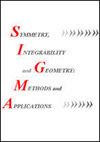De Finetti Theorems for the Unitary Dual Group
IF 1
3区 物理与天体物理
Q2 MATHEMATICS
Symmetry Integrability and Geometry-Methods and Applications
Pub Date : 2022-03-11
DOI:10.3842/SIGMA.2022.067
引用次数: 1
Abstract
We prove several de Finetti theorems for the unitary dual group, also called the Brown algebra. Firstly, we provide a finite de Finetti theorem characterizing $R$-diagonal elements with an identical distribution. This is surprising, since it applies to finite sequences in contrast to the de Finetti theorems for classical and quantum groups; also, it does not involve any known independence notion. Secondly, considering infinite sequences in $W^*$-probability spaces, our characterization boils down to operator-valued free centered circular elements, as in the case of the unitary quantum group $U_n^+$. Thirdly, the above de Finetti theorems build on dual group actions, the natural action when viewing the Brown algebra as a dual group. However, we may also equip the Brown algebra with a bialgebra action, which is closer to the quantum group setting in a way. But then, we obtain a no-go de Finetti theorem: invariance under the bialgebra action of the Brown algebra yields zero sequences, in $W^*$-probability spaces. On the other hand, if we drop the assumption of faithful states in $W^*$-probability spaces, we obtain a non-trivial half a de Finetti theorem similar to the case of the dual group action.酉对偶群的De Finetti定理
我们证明了酉对偶群(也称为布朗代数)的几个de Finetti定理。首先,我们给出了具有相同分布的$R$对角线元素的有限de Finetti定理。这是令人惊讶的,因为它适用于有限序列,而不是经典群和量子群的de Finetti定理;而且,它不涉及任何已知的独立性概念。其次,考虑到$W^*$-概率空间中的无限序列,我们的表征可以归结为算子值的自由中心圆元素,就像一元量子群$U_n^+$的情况一样。第三,上述de Finetti定理建立在对偶群作用的基础上,对偶群作用是将布朗代数视为对偶群时的自然作用。然而,我们也可以给布朗代数配备一个双代数作用,它在某种程度上更接近量子群设置。然后,我们得到了一个no-go de Finetti定理:在Brown代数的双代数作用下,在$W^*$-概率空间中,不变性产生零序列。另一方面,如果我们在$W^*$-概率空间中放弃忠实状态的假设,我们得到了一个类似对偶群作用的非平凡半de Finetti定理。
本文章由计算机程序翻译,如有差异,请以英文原文为准。
求助全文
约1分钟内获得全文
求助全文
来源期刊
CiteScore
1.80
自引率
0.00%
发文量
87
审稿时长
4-8 weeks
期刊介绍:
Scope
Geometrical methods in mathematical physics
Lie theory and differential equations
Classical and quantum integrable systems
Algebraic methods in dynamical systems and chaos
Exactly and quasi-exactly solvable models
Lie groups and algebras, representation theory
Orthogonal polynomials and special functions
Integrable probability and stochastic processes
Quantum algebras, quantum groups and their representations
Symplectic, Poisson and noncommutative geometry
Algebraic geometry and its applications
Quantum field theories and string/gauge theories
Statistical physics and condensed matter physics
Quantum gravity and cosmology.

 求助内容:
求助内容: 应助结果提醒方式:
应助结果提醒方式:


